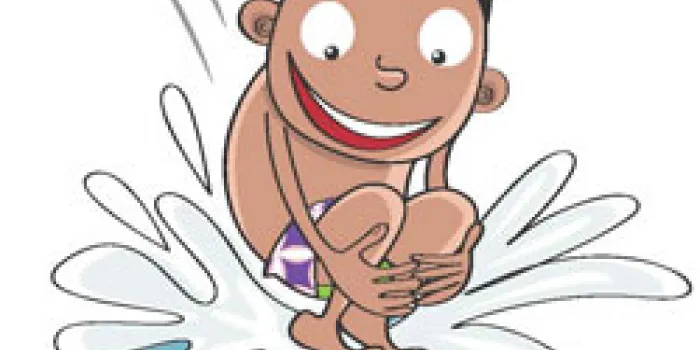It’s easy to feel cooped up in school all day. That’s why summer is so great! It’s warm, you have more free time and there are lots of fun things to do like riding your bike, playing with friends and swimming. But before you get started, here are some important tips to keep your body safe so you can have fun this summer:
Water Works
Swimming is one of the best activities in the summer. It cools you off, and you can splash and play in the water. For kids with bleeding disorders, swimming is also a great sport for your joints! That’s because water doesn’t put pressure on your knees, elbows or ankles.
But pools and lakes can be dangerous if you’re not careful. Keep these tips in mind when you head into the water this summer:
- Don’t swim alone. Always make sure you have a buddy to swim with or, even better, an adult or camp counselor nearby. They can help in case there’s an emergency.
- Cannonball! Diving boards can be a lot of fun, but remember to look before you leap. Make sure the water is deep enough before you dive or jump.
- Stay away from pool filters. The suction can be so strong that you might not be able to swim away if your arm or leg gets too close. If you see a filter, swim away from it.
- Even if you’re a great swimmer, it’s important to keep a flotation device nearby or wear one. This could be a life jacket, a life preserver or a raft. If you get tired while swimming, grab one of these and it will help you stay afloat.
- Summer storms happen a lot! If you hear thunder or see lightning, get out of the water.
Easy Riding
Bike riding is a fun sport. From trails to sidewalks, it’s a good way to exercise and enjoy the outdoors. But accidents can happen, and you need to be prepared. Follow these tips when riding your bike this summer:
- Before you hop on, check to make sure your bike is in good condition. Check your brakes and tires. Are your brake pads flaky? They might need to be replaced. Squeeze your brakes. Do your brake pads touch your wheel rims? If not, they also need to be replaced. Push on your tires. They should feel pretty hard, but still go in a little. If they feel too soft, they might need more air.
- After you check out the bike, suit up! You need to wear a helmet, even if you’re riding a short distance. It’s a law in some states. Ask your parents if your helmet is approved by the American National Standards Institute or Snell Memorial Foundation. That means it’s safe to use. Padded gloves and elbow pads can also protect your hands and arms. Wear bright, reflective clothing. That makes it easier for drivers to see you.
- When you’re riding on a street or sidewalk, stay in single file. If you need to turn, remember to use hand signals. That lets people behind you know that you’re about to change course. Putting your hand up and out to the left means you’re going to make a left turn. Stick your hand up and to the right to make a right turn, or down to signal a stop.
- Always stay alert and look out for anything in your way, like sticks, branches or even people!
Bug Off
In the warm summer months, kids take a vacation—but the bugs don’t! Critters like mosquitoes, bees and ticks are active during the summer. Sometimes they can carry diseases that can make you sick. Luckily, there are some easy ways to protect your skin and body.
- Wear light-colored clothing. Bees are less likely to come near you.
- If you’re hiking outdoors, stay away from underbrush and tall grass. Wearing tall socks and securing your clothing can also help. (Use tape to seal off your pant legs and shirt cuffs. Tucking your pant legs into your socks or using Velcro closures on your clothing will also work.)
- Use insect repellent. A chemical called DEET keeps the bugs away, but make sure it has less than 10%. A repellent with more than 10% DEET could give you a skin rash, irritate your eyes or make you feel dizzy and sick. If you need help reading the label, ask your parents.
- After being outdoors, check yourself for ticks, or have someone else do it. Look under your arms, in and around your ears, behind your knees, around your waist and inside your belly button. If you find a tick on you, ask an adult to remove it. Adults should disinfect the area first and then use fine-tipped sterilized tweezers to pull it off. Afterward, it’s important to clean and disinfect the area with soap and warm water or alcohol again.
- If a bee or wasp stings you, clean your skin where the bite is. Sometimes ice can make the pain go away. And be careful—if you have any trouble breathing after you get stung, you might be allergic. Tell an adult and go to the emergency room right away.
Even when you follow these safety tips, accidents can happen. But don’t panic. Your parents or guardians, teachers and friends can help you if something happens. There’s so much to look forward to this summer—don’t forget to have fun, too!

